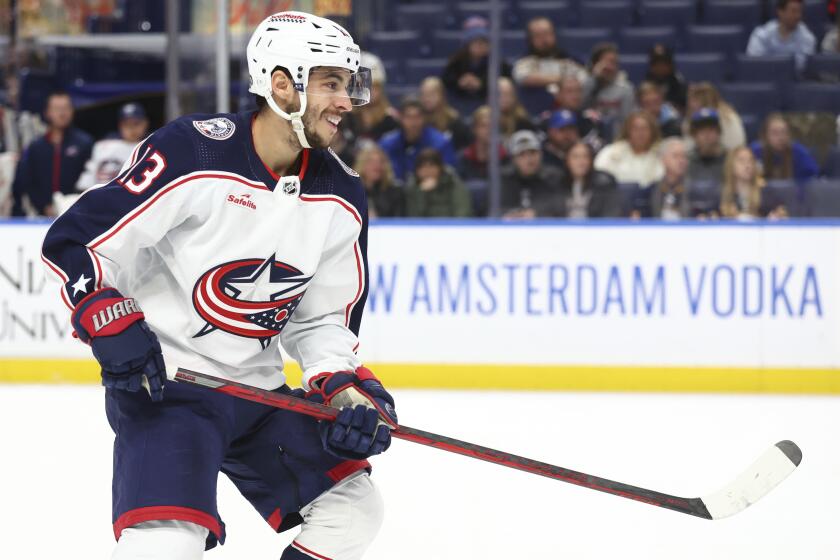Mercury Morris, part of Dolphins’ two Super Bowl wins and perfect season, dies at 77

- Share via
MIAMI GARDENS, Fla. — Eugene “Mercury” Morris, who starred for the unbeaten 1972 Miami Dolphins as part of a star-studded backfield and helped the team win two Super Bowl titles, has died, the team said Sunday.
Morris, a three-time Pro Bowl selection, was 77. In a statement, his family said his “talent and passion left an indelible mark on the sport.”
“Beyond the field, Mercury was a devoted father, a loving brother, a loyal friend, and a pillar in the community,” his family wrote in the statement. “His presence extended far beyond football, as he touched the lives of many throughout his time in Miami.”
Chad McQueen, an actor known for his performances in the ‘Karate Kid’ movies who was the son of the late actor and racer Steve McQueen, has died. He was 63.
Morris was the starting halfback and one of three go-to runners that Dolphins coach Don Shula utilized in Miami’s back-to-back title seasons of 1972 and 1973, alongside Pro Football Hall of Famer Larry Csonka and Jim Kiick. Morris led the Dolphins in rushing touchdowns in both of those seasons, finishing with an NFL-best 12 in 1972 and then 10 more in 1973.
Those two seasons — the best in Dolphins’ history — just happened to be the best of Morris’ eight-year career as well. He rushed for a career-high 1,000 yards in 1972, then ran for 954 more along with a league-best 6.4 yards per carry the following season.
“I think Shula gave everybody a different kind of direction and purpose being coached by this guy,” Morris said in 2008. “We were middle-class people and middle-class fans, and Shula was a blue-collar worker. And he had kind of a work ethic that really allowed you to see that if you work hard and you do what you’re supposed to do, then things are going to turn out for you — not all the time but you adjust to that and do what’s necessary to try to do as best you can.”
Morris made no secret of being filled with pride about the 1972 Dolphins being the first — and still only — undefeated and untied team in NFL history, pulling off a perfect season.

He also tried to make this clear: No, the Dolphins were not rooting against the teams that came close to matching their feat of perfection and did not have champagne on ice waiting for the moment that the last unbeaten team in a season gets defeated.
“And for the record, we DO NOT TOAST every time an unbeaten team loses,” Morris posted on social media in 2015, when the Cam Newton-led Carolina Panthers started 14-0 before losing the next-to-last game of their regular season. “There’s no champagne in my glass, only Canada Dry Ginger ale! Ha!”
That sense of humor also got pointed at his beloved Dolphins at times. When Miami was 0-8 in the 2007 season, on its way to a 0-13 start and 1-15 record, Morris offered another of his many memorable quips.
“The Dolphins are not embarrassing me, because our record’s at the top of the heap,” Morris said. “That’s not my team. People say, ‘Your team is doing bad.’ I say, ‘My team all has AARP cards.’”
Blue Jackets star Johnny Gaudreau and his brother, Matthew, were killed when they were hit by a suspected drunk driver while riding bikes in New Jersey, police said.
Morris had some personal struggles after his football career ended, most notably being sentenced to 20 years in prison after his 1982 conviction on cocaine trafficking charges. He fought the conviction, admitting he used cocaine — in part to deal with numerous lingering injuries — but never sold the drug. His conviction was overturned by the Florida Supreme Court in 1986, and Morris became a motivational speaker urging people to avoid drugs.
“Was I bitter? Not really,” Morris wrote in his book “Against The Grain,” published in 1998. “I would not recommend three days in jail to anyone, much less three years. But I must be honest: I needed to go through what I did to develop the character I had when I became a free man.”
Morris went into the Dolphins’ Walk of Fame in 2013. He remains fourth on the team’s all-time rushing list with 3,877 yards behind Csonka (6,737), Ricky Williams (6,436) and Ronnie Brown (4,815).
Reynolds writes for the Associated Press.
More to Read
Go beyond the scoreboard
Get the latest on L.A.'s teams in the daily Sports Report newsletter.
You may occasionally receive promotional content from the Los Angeles Times.










